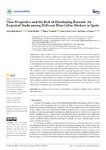Time Perspective and the Risk of Developing Burnout: An Empirical Study among Different Blue-Collar Workers in Spain

Use this link to cite
http://hdl.handle.net/2183/27678Collections
- Investigación (FDER) [672]
Metadata
Show full item recordTitle
Time Perspective and the Risk of Developing Burnout: An Empirical Study among Different Blue-Collar Workers in SpainDate
2021-03-16Citation
Reig-Botella, A.; Detaille, S.; Clemente, M.; López-Golpe, J.; de Lange, A. Time Perspective and the Risk of Developing Burnout: An Empirical Study among Different Blue-Collar Workers in Spain. Sustainability 2021, 13, 3271. https://doi.org/10.3390/su13063271
Abstract
[Abstract] The purpose of this research was to analyze the relationship between the time perspective
of Spanish shipyard workers in relation to burnout compared to other blue-collar workers in other sectors, including a total of 644 participants in a shipyard in northern Spain and 223 workers in other sectors. The ages were between 20 and 69 (M = 46.14, SD = 10.98). We used the Spanish version of the Zimbardo Time Perspective Instrument (ZTPI) and the Maslach Burnout Inventory–General Survey (MBI-GS). The mean of the three reliability coefficients of the emotional exhaustion factor was 0.887. In respect to the five factors of the ZTPI questionnaire, the mean of those five coefficients was 0.86. A Student’s t-test for independent samples comparing shipyard naval workers vs. the control
group in personality variables and burnout was used. The psychological difference between workers in the naval sector and those in other sectors is better predicted based on two variables: emotional exhaustion and professional efficacy. Workers in the naval sector have a higher risk of becoming burnt-out than workers in other sectors due to a negative past, present and future time perspective. This can be a consequence of constant understimulation and monotonous and repetitive work, as well as a lack of autonomy and social support at work.
Keywords
Blue-collar workers
Burnout
Cross-sectional
Occupational health
Sectors
Shipyard
Time perspective
Burnout
Cross-sectional
Occupational health
Sectors
Shipyard
Time perspective
Editor version
Rights
Atribución 4.0 Internacional
ISSN
2071-1050






